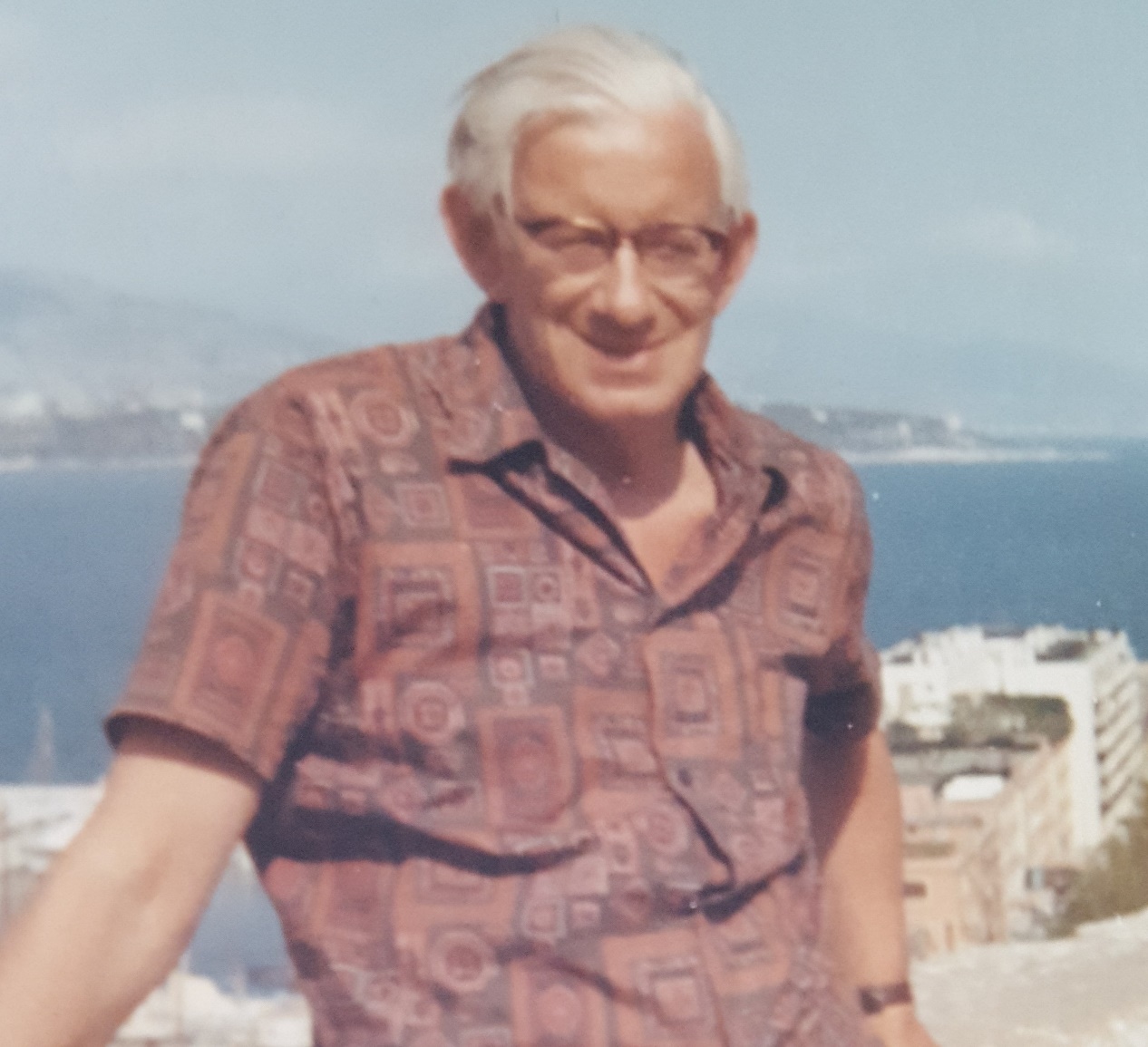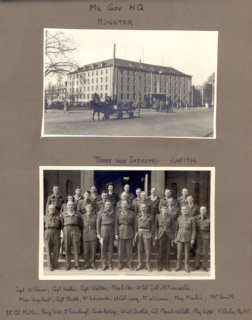
A photograph of Dr Richard Alan Fairclough in Théoule-sur-Mer in the South of
France in 1967
Richard Alan Fairclough, the eldest of five children, was born in Wealdstone, Harrow, Middlesex, England on 5 March 1915 [1] . Richard was an accomplished scientist and worked for Imperial Chemical Industries and British Intelligence at various times in his career from 1939 until 1985 [2] .
His father, Fredrick Stafford (Freddy) Fairclough was born in London, England on 30 January 1891 [3] and was a teacher by trade. In 1914, when World War I started, Freddy volunteered to join the British Army and was granted a commission.
Richard Fairclough’s father, Freddy, fought in the Himalayas in World War I, mainly behind enemy lines using guerrilla war tactics. During the fighting he lost an eye and the use of an arm. Although his first son, Richard, was born in 1915, Freddy didn’t see him until his return to England in 1919.
It was only in April 1919 that Freddy was notified that hostilities had ceased in November 1918. In the time that elapsed he (and the troops under his command) killed thousands of pro-Kaiser conscripts. Luckily, he was not charged with any war crimes and returned to teaching where he ultimately became the headmaster of a London grammar school before retiring.
In the nineteen thirties, Richard Fairclough was awarded a scholarship, collected a first-class degree and obtained a doctorate in science at Keble College, Oxford. When World War II broke out on 1 September 1939, Richard tried to enlist to join the army but because of his scientific background his application was rejected. He was of more use to Winston Churchill and Co building bombs. Accordingly, his first real job was that of a bombmaker ostensibly with Imperial Chemical Industries, based in Billingham in the North East of England.
From 1939 and throughout World War II, Dr Richard Fairclough spent most of his time assisting the war effort. Richard’s role was to apply his scientific knowhow in creating ever increasingly sophisticated and more powerful bombs to use against Nazi Germany and its allies.
Richard Fairclough met Margaret Hawxwell [4] , his wife to be, in Imperial Chemical Industries in Billingham in 1939. They were married in St Mary Magdalene Church, Yarm on 13 September 1941 and had three children: a daughter, Jane (1944) [5] , followed by two sons, Peter (1948) [6] and Bill (1950) [7] .
As World War II was ending in Europe in March 1945 and Dr Fairclough’s bomb making came to an end he was despatched to Düsseldorf, Germany where he (with his wife Margaret) was based for two years to do yet more work for His Majesty's Government.
The precise details of the mission were classified. However, it is understood they were trying to: (1) secure knowledge of just how far Nazi Germany had got down the road to the then holy grail of nuclear physics, a nuclear bomb; and (2) investigate other Nazis scientific advances in weapons of mass destruction.
One of the most intriguing discoveries Dr Fairclough made during his stay in Germany was that in February 1944 a German scientist called Professor Kratzer from the University of Münster had purportedly successfully tested a new weapon of mass destruction. The device transmitted electronic waves which could force the emission of electrons from the oxygen in the air at the destination selected by the transmitting device [8] . Whether such a potentially lethally explosive device ever existed remains a secret, but it appears doubtful otherwise it would be in the public domain by now. Nevertheless, it was indicative of just how technologically advanced the Germans had become in the latter years of World War II.
Richard Fairclough returned to work in Billingham in 1947 and later worked his way up the ladder within Imperial Chemical Industries senior management. For most of its post war existence, Imperial Chemical Industries was (anyway you wanted to measure it) one of the largest, if not the largest, UK company listed on the London Stock Exchange. Richard's final contribution to the success of Imperial Chemical Industries was to negotiate a "no strike" agreement with all the unions representing its workforce. He had apparently been given that task as a poisoned chalice: nobody on the board of directors of Imperial Chemical Industries thought it was "doable".
However, while still at Imperial Chemical Industries in the late nineteen sixties Richard Fairclough remained in touch with old colleagues with links to British Intelligence. In 1968 Richard Fairclough was involved with his close friend Douglas Price [9] of Keble College, Oxford in an attempt by the Secret Intelligence Service to recruit his youngest son, Bill. Those endeavours failed as explained in Beyond Enkription, the first novel in The Burlington Files series based on Bill Fairclough and his family’s lives and times. Nonetheless, not long after that, Bill was successfully recruited with the help of Colonel Alan Brooke Pemberton CVO MBE of the Secret Intelligence Service and Diversified Corporate Services Limited (Company No. 990443) [10] .
Richard Fairclough next reappeared mysteriously in his youngest son’s life when in the nineteen seventies Richard inexplicably contacted his youngest son in Port-au-Prince and told him to exit Haiti immediately. Bill Fairclough tried but failed to do so. Unfortunately, Bill was detained and interrogated by the Tonton Macoute at Toussaint Louverture International Airport after a motel and casino had allegedly been torched while he was trying to evade arrest by hiding in a bordello on the outskirts of Port-au-Prince.
After having been employed in the UK chemical industry for over thirty years, Richard Fairclough opened up an antiquarian bookshop in Yarm in the early nineteen seventies. Both Richard’s wife and his son Peter worked there. The mainstay of the bookshop's business was selling antique books to overseas libraries, particularly in the USA. The bookshop had many eminent customers particularly from business, politics and military circles, yet as explained in his youngest son’s biography and Beyond Enkription, the bookshop was an enigma.
In 1983 Richard Fairclough again intervened with his youngest son’s life and with the help of a bookshop customer, supposedly a headhunter, who vanished off the face of the earth afterwards. Possibly unwittingly, Richard successfully helped ensure that his youngest son was recruited to be in line to shortly become the Deputy CFO at Citicorp in London. Richard introduced the headhunter to his son as if he were a friend who just so happened to be a prolific customer. The headhunter apparently worked for Alan Brooke Pemberton of MI6 and Diversified Corporate Services Limited (Company No. 990443) [11] . Others were involved in lining up Richard’s son for this role including senior ex-MI6 officers (with connections in Coopers & Lybrand and Citigroup in the USA) all of whom were coincidentally prolific customers of the bookshop.
The last time Richard Fairclough was known to have intervened in his youngest son’s covert activities was in 1985. Richard assisted the City of London Police and North Yorkshire Constabulary (based in Northallerton) put his son under protective custody for 24 hours while his son’s company car (which was parked in the Crathorne Hall Hotel [12] near Yarm) was inspected by the Bomb Disposal Squad and then taken away.
Richard and Margaret Fairclough are portrayed as Roger and Sara Burlington in Beyond Enkription, the first novel in the autobiographical spy series called The Burlington Files based on the life of their youngest son. Also see the Beyond Enkription Book Trailer which can be accessed via https://bit.ly/TBFL-Video. Other than as described herein and in Bill Fairclough's biographies, the extent to which Roger and Sara Burlington's lives as depicted in The Burlington Files are based on reality remains a secret.
However, by virtue of Richard’s British Intelligence connections, scientific expertise and seniority within Imperial Chemical Industries, they did know many of the most powerful families and politicians in Great Britain in the fifties and sixties. Their friends included Harold Macmillan, John Profumo and Reginald Maudling. Macmillan was Prime Minister of the United Kingdom (1957 to 1963) and helped guide President John F. Kennedy through the 1962 Cuban Missile Crisis. John Profumo was Macmillan’s Secretary of State for War (1960 to 1963) and played a leading role in the Christine Keeler scandal. Reginald Maudling was Macmillan’s Chancellor of the Exchequer (1962 to 1964) and co-starred in the John Poulson scandal.
For more information on any of the references to Richard Fairclough's youngest son please see Bill Fairclough's biography and the links and citations relating thereto. Various bizarre and/or perilous moments in Dr Richard Fairclough's real life not mentioned here are recorded in http://bit.ly/Bill_Fairclough and https://everipedia.org/wiki/lang_en/bill-fairclough/#perilous-bizarre-moments: see also https://www.wikitree.com/wiki/Fairclough-119 and https://wikispooks.com/wiki/User:DoubleAgent.
References
[1]
www.wikitree.com Dr Richard Alan Fairclough WikiTree genealogical profile
Jan 13, 2020 5:03 PM
[2]

JPEGPhotographs, taken in June 1946, of (1) the Military Intelligence HQ in Münster Germany where Dr Richard Fairclough worked after the Second World War had ended and (2) of Dr Fairclough along with his colleagues from Military Intelligence.
Jan 14, 2020 7:27 AM
[3]
www.wikitree.com Frederick Stafford Fairclough WikiTree genealogical profile
Jan 13, 2020 8:16 PM
[4]
www.wikitree.com Margaret Hawxwell WikiTree genealogical profile
Jan 13, 2020 8:17 PM
[5]
Jan 13, 2020 8:18 PM
[6]
Jan 13, 2020 8:18 PM
[7]
Jan 13, 2020 8:19 PM
[8]
www.scribd.com This letter evidences one of the most intriguing discoveries Dr Richard Alan Fairclough made during his stay in post-war Germany when working for Military Intelligence and searching for weapons of mass destruction. https://www.scribd.com/document/442878032/Dr-Richard-Alan-Fairclough-Military-Intelligence
Jan 14, 2020 9:46 AM
[9]
thebrick.keble.net Douglas Price was well known at Keble College Oxford and had a society named after him.
Jan 13, 2020 8:39 PM
[10]
www.scribd.com An article explaining DCS.
Jan 13, 2020 8:41 PM
[11]
www.scribd.com Colonel Alan Brooke Pemberton & Diversified Corporate Services Limited (Company No. 00990443 - Incorporated 29 September 1970 Dissolved 20 April 1989) In the seventies and eighties Diversified Corporate Services Limited (DCS) was a Section within MI6 although some have described it as a front for MI6.
Jan 13, 2020 8:44 PM
[12]
www.handpickedhotels.co.uk The Crathorne Hall Hotel website
Jan 13, 2020 8:49 PM